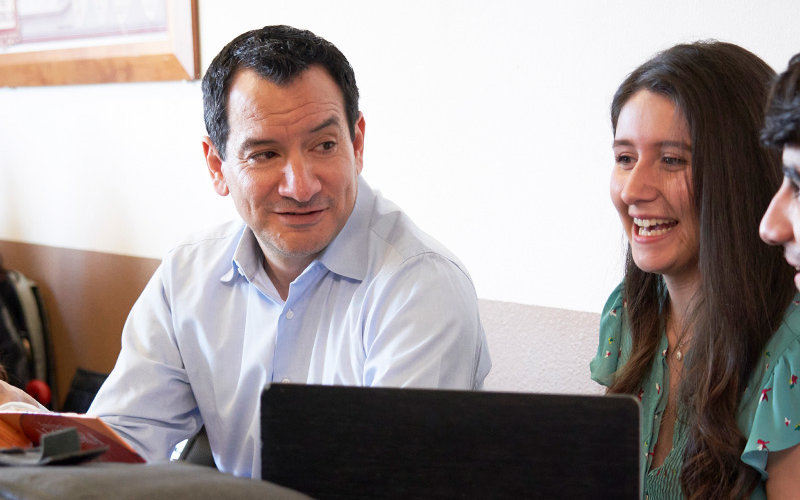
At a time when people around the world are feeling anxious about the novel coronavirus pandemic, Speaker of the California State Assembly Anthony Rendon spent a candid hour video conferencing about the topic and more with political science students from his alma mater, Cal State Fullerton.
“Politics and Policy Making in America,” taught by Associate Professor of Political Science Sarah Hill, typically offers students such immersive experiences as visiting the State Capitol and meeting with Titan alumni working in politics.
With in-person meetings no longer viable, Rendon ’92, ’94 (B.A., M.A. political science) logged into the online class via Zoom March 24 to field student questions and share his own journey to politics.
“Before the pandemic, students learned general theories and concepts about the policymaking process, as well as the basics of California government and the state legislature,” said Hill. “We’re now going to use those concepts to watch how the government responds to COVID-19.
“I’ve encouraged students to pay careful attention to how the federal government and states are working together (or not), the role of executive leadership, how each level of government is responding, how policy is being made in a crisis and how that’s similar to or different from the normal policymaking process,” she explained.
“My hope is that students develop a greater appreciation for the role of government and why we need passionate, highly qualified people working at all levels of government. Public service is honorable, necessary and critical for society.”
Below is a snapshot of the conversation between Speaker Rendon and students:
How is the pandemic affecting the priorities of your office?
There are about 1,100 people working in the Capitol on a daily basis. Now there are about seven people in the building, including me. The work has changed. I think we had something like 3,300 bills introduced this year; when we get back to session, we may have time to hear 600 or 700 of those bills. Right now we’re prioritizing coronavirus as a policy area.
How is government working to address the coronavirus pandemic?
The state authorized the governor to spend $1 billion on the coronavirus pandemic, exclusively for health-related issues. The federal relief package will start to address issues outside of the health care field. In the long term, it’s the economy that’s going to be ruined. There are going to be businesses that I’m never going to see open again in my district. And to a large extent, I think that’s up to us as Californians to fix. I don’t know that the federal government will help California in that way.
Why is it important for people to answer the census and to be engaged in politics?
The census is incredibly important in getting an accurate count of how many Californians there are. It determines the percentage of funds we get for social programs, transportation, veterans, housing programs, education and everything you can think of that comes from the federal government. In terms of being engaged in politics, what I always say is that there are a lot of ways to be involved. Knowing about the political system doesn’t just prepare you for a job in politics; it prepares you to be a good and involved citizen.
How is government working to address the homelessness crisis and affordable housing?
At the state level, a lot of what we can do is allocate funding. The application of those funds and the administering those funds is really at the local level. Affordable housing for young people is definitely on our radar as well. It’s amazing how our society has become divided between people who own property and those who don’t. I think those divisions, and the levels of resentment that develop as a result, threaten our social fabric.
How can students have a voice in educational policy decisions?
By virtue of being Speaker, I serve on the Cal State Board of Trustees and the UC Board of Regents. The Cal State Board of Trustees meets in Long Beach, and I really encourage you to attend those meetings and to get involved. When we go to those meetings, it’s great to see 40 to 50 students there, but it’s usually the same ones. To see new faces and to make sure that we’re hearing from you is really important, now more than ever.
What advice do you have for students who are soon graduating and looking to enter the workforce during an economic downturn?
Jobs related to our aging population or early childhood education tend to be fairly stable. I think those are two areas of the economy where you’re going to see job growth continue to happen, or at least the decrease won’t be as bad. Where you’re going to see problems is anything relating to expendable income — the arts, entertainment, tech, tourism, travel, eating out — those areas are going to be hit hard.